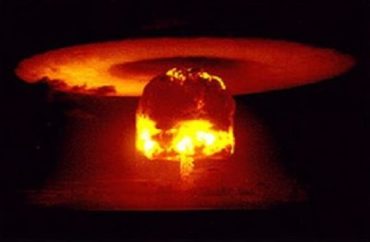
I suppose it was inevitable that following the release of “Oppenheimer,” the biopic about the father of atomic bomb, the progressive collective would lose its uni-mind.
It happens every year, after all, on August 6 and 9 — the dates the U.S. dropped atomic bombs on Japan thus ending World War II.
It’s worse when it’s an anniversary (2025 will be the 80th).
These Monday morning-quarterback geniuses will tell you everything from the Japanese were ready to surrender anyway to war crimes charges should have been lodged against those involved with the Manhattan Project.
1619 Project creator and Howard U. journalism professor Nikole Hannah-Jones did just this two years ago on the anniversary of the Nagasaki bombing, saying the U.S. went ahead and dropped its second nuke unnecessarily because it had to “justify” the expense of the A-bomb.
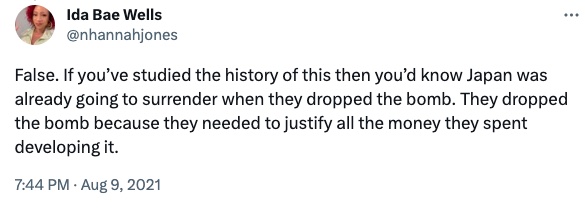
Earlier still, leftist author Kim Stanley Robinson wrote an alternate history tale titled “The Lucky Strike” in which pilot Paul Tibbets is killed in a landing accident (in what would have been called the Enola Gay).
In the alternate B-29 flight which carries the “Little Boy,” Captain Frank January sabotages the mission by dropping the A-bomb minutes later than planned — so that Hiroshima is spared a direct hit.
January is of the belief that a demonstration of the bomb’s power, without killing tens of thousands of people, will be sufficient for a Japanese surrender.
As January sits in the brig awaiting execution for his treasonous actions, the second A-bomb mission to Kokura also misses to due to heavy cloud cover. Shortly thereafter, Japan surrenders, thereby validating January’s actions.
Even more utopian is Robinson noting that years later a “January Society” was established in the captain’s honor which had an “effect” on President Thomas Dewey during the (alternate) Korean “crisis.” And more incredibly, it led to a complete worldwide abandonment of nuclear weapons.
MORE: Princeton course explores link between ‘settler colonialism’ and ‘nuclear science’
But at least Robinson’s naïveté played out in the realm of fiction. The “Oppenheimer” takes by the modern hate-America-at-all-costs Left are truly a thing to behold:

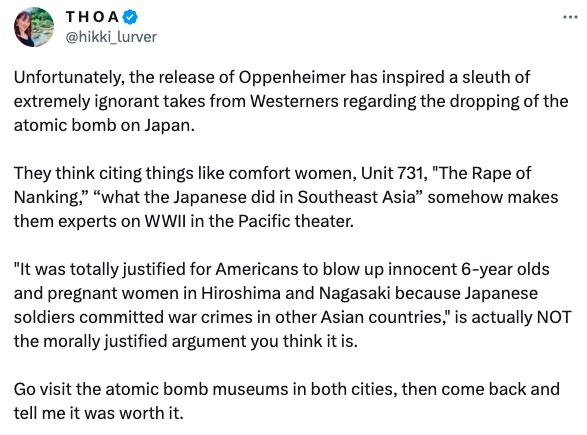
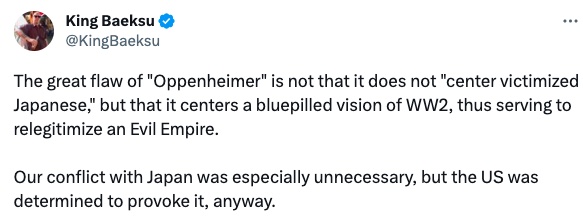
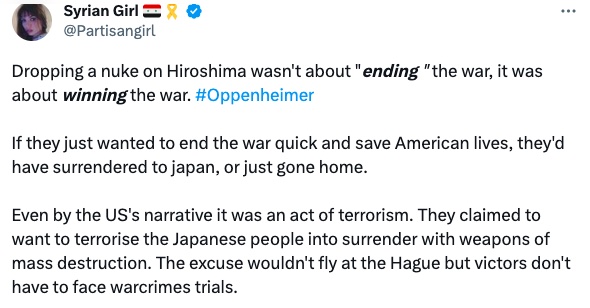

Predictably, too, The Guardian highlighted the woes of anti-nuke organizations, noting “Oppenheimer” “skirts around the human suffering caused by the bomb.”
The Campaign for Nuclear Disarmament’s Carol Turner complained that the “overall impact of the film is unbalanced” because it leaves moviegoers with the impression that the process of the Manhattan Project was “exciting” — rather than zeroing in on how terrible nuclear weapons really are.
Turner added the depictions of the horrors in Hiroshima and Nagasaki were nowhere near as “horrifying” as the reality. Which likely is true.
However, what’s overlooked is that neither of the A-bombs initially were as devastating as the firebombing of Tokyo, which had occurred over the course of months in 1944-1945. Over 100,000 Japanese were killed in just one of those raids, Operation Meetinghouse, in March, 1945.
Sadly, too, various outlets even botched basic facts surrounding the A-bomb. The worst example probably was The Nation noting that Oppenheimer was pressured for the first test of the new A-bomb … in 1946. (The error was corrected three days after publication … perhaps because yours truly pointed it out on Twitter.)

Less egregious was an “Oppenheimer” “what-to-know” page from Temple University. In describing how the atomic bomb worked, it says neutrons are “bombarded” with uranium or plutonium … but it’s actually the other way around. (A stream of the sub-atomic particle — neutrons — is shot into a piece of uranium or plutonium.) I contacted the page’s “content producer” about the discrepancy, but never heard back.
Rich Lowry’s piece on “Oppenheimer” and the regurgitated revisionism is something that should be brought up each and every time some wannabe history virtuoso tries to sound informed. This one paragraph sums it up succinctly:
“We were fighting a merciless foe in a savage war where every day brought more suffering and devastation, to combatants and civilians alike and across Asia. The best thing that could happen was ending the war as soon as possible, and the atom bomb brought it to a swift and decisive conclusion.”
‘Nuff said.
MORE: On the 70th anniversary of the atomic bombings of Japan, beware the revisionists
IMAGES: MaximasPrime/Flickr.com; Twitter screencaps
Like The College Fix on Facebook / Follow us on Twitter

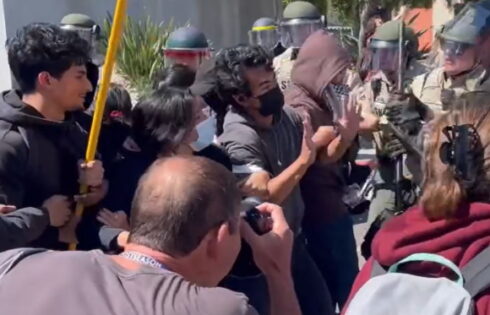
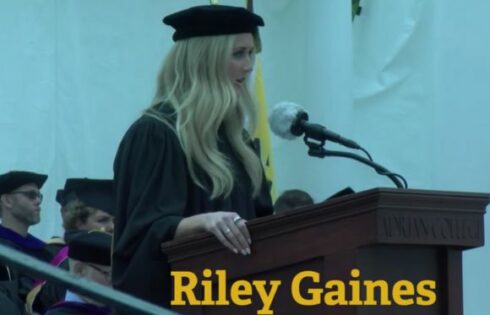



Please join the conversation about our stories on Facebook, Twitter, Instagram, Reddit, MeWe, Rumble, Gab, Minds and Gettr.